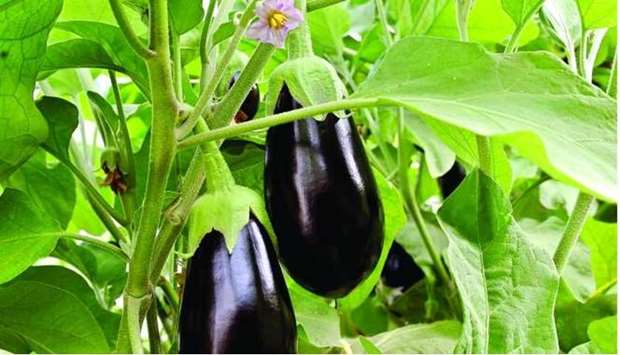The Ministry of Municipality and Environment (MME) is set to publish an agriculture calendar aimed at maintaining "balanced and proper production practices" and simultaneously enhancing self-sufficiency in locally produced vegetables.
Local Arabic daily Arrayah reported that the calendar has been prepared by the ministry's Agriculture Affairs Department and aimed at achieving considerable rates of self-sufficiency in six types of vegetables including tomatoes, cucumber, zucchini, capsicum, eggplants and leafy vegetables.






This entails giving the farms advice on the proper timing of planting and harvesting each crop to maintain adequate balance between production and market needs to achieve the desired economic benefits for the farmers. According to this calendar, the desired self-sufficiency of tomatoes all year round would be 54% in January, 90% February, 91% March, 92% April, 72% May, 12% June, 6% July, 2% August, 1% October, 2% November, and 34% in December, which means an average of 38% self-sufficiency a year.
This would help the farmers to calculate the best timing to increase their production and avoid over production at other times to avoid severe drops in retail prices. For instance, they need to keep moderate production during the period from February until May and increase their production during June until November.
As for cucumber, the calendar indicates that the desired self-sufficiency amounts to 92% in January, 86% February, 103% March, April 76%, June 45%, July 26%, August 15%, September 22%, October 93%, September 22%, November 93%, and in December 73%.
As for leafy vegetables, the rates indicated by the calendar show that the self-sufficiency reaches 9% in January, 13% February, March 14%, April 17%, May 5%, and in December 9%. This means that the overall production of this category of vegetables amounts to 6% of the yearly needs of the local market. Accordingly, more focus is needed on such products to increase their availability during the different times of the year.
Accordingly, during the hot summer months, local vegetable production drops considerably as the hot weather conditions pose challenges, which require more sophisticated agricultural technology to overcome .
According to the farmers, this would eventually increase the overall cost of production. However, the MME has launched various initiatives to support local farmers and help them continue their production such as distributing free modern greenhouses to registered farms and giving them seeds, fertilisers and water and electricity at subsidised rates, in addition to the related efforts in the field of agriculture guidance and education.
Local Arabic daily Arrayah reported that the calendar has been prepared by the ministry's Agriculture Affairs Department and aimed at achieving considerable rates of self-sufficiency in six types of vegetables including tomatoes, cucumber, zucchini, capsicum, eggplants and leafy vegetables.






This entails giving the farms advice on the proper timing of planting and harvesting each crop to maintain adequate balance between production and market needs to achieve the desired economic benefits for the farmers. According to this calendar, the desired self-sufficiency of tomatoes all year round would be 54% in January, 90% February, 91% March, 92% April, 72% May, 12% June, 6% July, 2% August, 1% October, 2% November, and 34% in December, which means an average of 38% self-sufficiency a year.
This would help the farmers to calculate the best timing to increase their production and avoid over production at other times to avoid severe drops in retail prices. For instance, they need to keep moderate production during the period from February until May and increase their production during June until November.
As for cucumber, the calendar indicates that the desired self-sufficiency amounts to 92% in January, 86% February, 103% March, April 76%, June 45%, July 26%, August 15%, September 22%, October 93%, September 22%, November 93%, and in December 73%.
As for leafy vegetables, the rates indicated by the calendar show that the self-sufficiency reaches 9% in January, 13% February, March 14%, April 17%, May 5%, and in December 9%. This means that the overall production of this category of vegetables amounts to 6% of the yearly needs of the local market. Accordingly, more focus is needed on such products to increase their availability during the different times of the year.
Accordingly, during the hot summer months, local vegetable production drops considerably as the hot weather conditions pose challenges, which require more sophisticated agricultural technology to overcome .
According to the farmers, this would eventually increase the overall cost of production. However, the MME has launched various initiatives to support local farmers and help them continue their production such as distributing free modern greenhouses to registered farms and giving them seeds, fertilisers and water and electricity at subsidised rates, in addition to the related efforts in the field of agriculture guidance and education.

